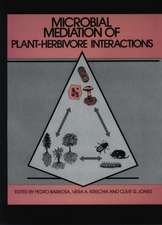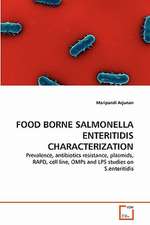Microbial Metabolic Engineering: Methods and Protocols: Methods in Molecular Biology, cartea 834
Editat de Qiong Chengen Limba Engleză Paperback – 23 aug 2016
Authoritative and practical, Microbial Metabolic Engineering: Methods and Protocols seeks to provide researchers with an overview of key topics on microbial metabolic engineering.
| Toate formatele și edițiile | Preț | Express |
|---|---|---|
| Paperback (1) | 702.54 lei 6-8 săpt. | |
| Humana Press Inc. – 23 aug 2016 | 702.54 lei 6-8 săpt. | |
| Hardback (1) | 956.81 lei 6-8 săpt. | |
| Humana Press Inc. – 6 dec 2011 | 956.81 lei 6-8 săpt. |
Din seria Methods in Molecular Biology
- 9%
 Preț: 791.59 lei
Preț: 791.59 lei - 23%
 Preț: 598.56 lei
Preț: 598.56 lei - 20%
 Preț: 882.95 lei
Preț: 882.95 lei -
 Preț: 252.04 lei
Preț: 252.04 lei - 5%
 Preț: 802.69 lei
Preț: 802.69 lei - 5%
 Preț: 729.61 lei
Preț: 729.61 lei - 5%
 Preț: 731.43 lei
Preț: 731.43 lei - 5%
 Preț: 741.30 lei
Preț: 741.30 lei - 5%
 Preț: 747.16 lei
Preț: 747.16 lei - 15%
 Preț: 663.45 lei
Preț: 663.45 lei - 18%
 Preț: 1025.34 lei
Preț: 1025.34 lei - 5%
 Preț: 734.57 lei
Preț: 734.57 lei - 18%
 Preț: 914.20 lei
Preț: 914.20 lei - 15%
 Preț: 664.61 lei
Preț: 664.61 lei - 15%
 Preț: 654.12 lei
Preț: 654.12 lei - 18%
 Preț: 1414.74 lei
Preț: 1414.74 lei - 5%
 Preț: 742.60 lei
Preț: 742.60 lei - 20%
 Preț: 821.63 lei
Preț: 821.63 lei - 18%
 Preț: 972.30 lei
Preț: 972.30 lei - 15%
 Preț: 660.49 lei
Preț: 660.49 lei - 5%
 Preț: 738.41 lei
Preț: 738.41 lei - 18%
 Preț: 984.92 lei
Preț: 984.92 lei - 5%
 Preț: 733.29 lei
Preț: 733.29 lei -
 Preț: 392.58 lei
Preț: 392.58 lei - 5%
 Preț: 746.26 lei
Preț: 746.26 lei - 18%
 Preț: 962.66 lei
Preț: 962.66 lei - 23%
 Preț: 860.21 lei
Preț: 860.21 lei - 15%
 Preț: 652.64 lei
Preț: 652.64 lei - 5%
 Preț: 1055.50 lei
Preț: 1055.50 lei - 23%
 Preț: 883.85 lei
Preț: 883.85 lei - 19%
 Preț: 491.88 lei
Preț: 491.88 lei - 5%
 Preț: 1038.84 lei
Preț: 1038.84 lei - 5%
 Preț: 524.15 lei
Preț: 524.15 lei - 18%
 Preț: 2122.34 lei
Preț: 2122.34 lei - 5%
 Preț: 1299.23 lei
Preț: 1299.23 lei - 5%
 Preț: 1339.10 lei
Preț: 1339.10 lei - 18%
 Preț: 1390.26 lei
Preț: 1390.26 lei - 18%
 Preț: 1395.63 lei
Preț: 1395.63 lei - 18%
 Preț: 1129.65 lei
Preț: 1129.65 lei - 18%
 Preț: 1408.26 lei
Preț: 1408.26 lei - 18%
 Preț: 1124.92 lei
Preț: 1124.92 lei - 18%
 Preț: 966.27 lei
Preț: 966.27 lei - 5%
 Preț: 1299.99 lei
Preț: 1299.99 lei - 5%
 Preț: 1108.51 lei
Preț: 1108.51 lei - 5%
 Preț: 983.72 lei
Preț: 983.72 lei - 5%
 Preț: 728.16 lei
Preț: 728.16 lei - 18%
 Preț: 1118.62 lei
Preț: 1118.62 lei - 18%
 Preț: 955.25 lei
Preț: 955.25 lei - 5%
 Preț: 1035.60 lei
Preț: 1035.60 lei - 18%
 Preț: 1400.35 lei
Preț: 1400.35 lei
Preț: 702.54 lei
Preț vechi: 826.53 lei
-15% Nou
Puncte Express: 1054
Preț estimativ în valută:
134.43€ • 140.71$ • 111.89£
134.43€ • 140.71$ • 111.89£
Carte tipărită la comandă
Livrare economică 31 martie-14 aprilie
Preluare comenzi: 021 569.72.76
Specificații
ISBN-13: 9781493959099
ISBN-10: 1493959093
Pagini: 319
Ilustrații: XII, 319 p.
Dimensiuni: 178 x 254 mm
Greutate: 0.58 kg
Ediția:Softcover reprint of the original 1st ed. 2012
Editura: Humana Press Inc.
Colecția Humana
Seria Methods in Molecular Biology
Locul publicării:Totowa, NJ, United States
ISBN-10: 1493959093
Pagini: 319
Ilustrații: XII, 319 p.
Dimensiuni: 178 x 254 mm
Greutate: 0.58 kg
Ediția:Softcover reprint of the original 1st ed. 2012
Editura: Humana Press Inc.
Colecția Humana
Seria Methods in Molecular Biology
Locul publicării:Totowa, NJ, United States
Cuprins
Screening for Cellulases with Industrial Value and their use in Biomass Conversion.- Reversal of NAD(P)H Cofactor Dependence by Protein Engineering.- Quantifying Plasmid Copy Number to Investigate Plasmid Dosage Effects Associated with Directed Protein Evolution.- High Isoprenoid Flux Escherichia coli as a Host for Carotenoids Production.- Mutagenic Inverted Repeats Assisted Genome Engineering (MIRAGE) in Saccharomyces cerevisiae: Deletion of gal7.-Creation of New Metabolic Pathways or Improvement of Existing Metabolic Enzymes by in vivo Evolution in Escherichia coli.- Bioluminescent Reporter Genes for Promoter Discovery.-Recombination-based DNA Assembly and Mutagenesis Methods for Metabolic Engineering.- Ethanol-tolerant Gene Identification in Clostridium thermocellum using Pyro-resequencing for Metabolic Engineering.-Use of Proteomic Tools in Microbial Engineering for Biofuel Production.-Metabolic Engineering of Antibiotic-producing Actinomycetes using in vitro Transposon Mutagenesis.-Use FACS Sorting in Metabolic Engineering of Escherichia coli for Increased Peptide Production.-Using Flux Balance Analysis to Guide Microbial Metabolic Engineering.-Using an Advanced Microfermentor System for Strain Screening and Fermentation Optimization.-Rapid Strain Evaluation using Dynamic DO-stat fed-batch Fermentation Under Scale-down Conditions.- Preparation and Evaluation of Lignocellulosic Biomass Hydrolysates for Growth by Ethanolgenic Yeasts.-Engineering Whole-cell Biosensors with No Antibiotic Markers for Monitoring Aromatic Compounds in theEnvironment.-Metabolic Engineering for Acetate Control in Large Scale Fermentation.-Minimization and Prevention of Phage Infections in Bioprocesses.
Textul de pe ultima copertă
Metabolic engineering is the practice of genetically optimizing metabolic and regulatory networks within cells to increase production and/or recovery of certain substance from cells. In Microbial Metabolic Engineering: Methods and Protocols expert researchers in the field detail many of the methods which are now commonly used to study metabolic engineering. These include methods and techniques to engineer genes and pathways, use of modern biotechnology tools in microbial metabolic engineering, and examples of metabolic engineering for real world applications such as whole cell biosensors and acetate control in large scale fermentation. Written in the highly successful Methods in Molecular Biology™ series format, chapters include introductions to their respective topics, lists of the necessary materials and reagents, step-by-step, readily reproducible laboratory protocols, and key tips on troubleshooting and avoiding known pitfalls.
Authoritative and practical, Microbial Metabolic Engineering: Methods and Protocols seeks to provide researchers with an overview of key topics on microbial metabolic engineering.
Authoritative and practical, Microbial Metabolic Engineering: Methods and Protocols seeks to provide researchers with an overview of key topics on microbial metabolic engineering.
Caracteristici
Strategies and techniques of metabolic engineering within the scope of microbial applications mainly focused on bacteria and yeasts Provides step-by-step detail essential for reproducible results Contains key notes and implementation advice from the experts Includes supplementary material: sn.pub/extras
Descriere
Descriere de la o altă ediție sau format:
Metabolic engineering is the practice of genetically optimizing metabolic and regulatory networks within cells to increase production and/or recovery of certain substance from cells. In Microbial Metabolic Engineering: Methods and Protocols expert researchers in the field detail many of the methods which are now commonly used to study metabolic engineering. These include methods and techniques to engineer genes and pathways, use of modern biotechnology tools in microbial metabolic engineering, and examples of metabolic engineering for real world applications such as whole cell biosensors and acetate control in large scale fermentation. Written in the highly successful Methods in Molecular Biology(TM) series format, chapters include introductions to their respective topics, lists of the necessary materials and reagents, step-by-step, readily reproducible laboratory protocols, and key tips on troubleshooting and avoiding known pitfalls. Authoritative and practical, Microbial Metabolic Engineering: Methods and Protocols seeks to provide researchers with an overview of key topics on microbial metabolic engineering.
Metabolic engineering is the practice of genetically optimizing metabolic and regulatory networks within cells to increase production and/or recovery of certain substance from cells. In Microbial Metabolic Engineering: Methods and Protocols expert researchers in the field detail many of the methods which are now commonly used to study metabolic engineering. These include methods and techniques to engineer genes and pathways, use of modern biotechnology tools in microbial metabolic engineering, and examples of metabolic engineering for real world applications such as whole cell biosensors and acetate control in large scale fermentation. Written in the highly successful Methods in Molecular Biology(TM) series format, chapters include introductions to their respective topics, lists of the necessary materials and reagents, step-by-step, readily reproducible laboratory protocols, and key tips on troubleshooting and avoiding known pitfalls. Authoritative and practical, Microbial Metabolic Engineering: Methods and Protocols seeks to provide researchers with an overview of key topics on microbial metabolic engineering.



























